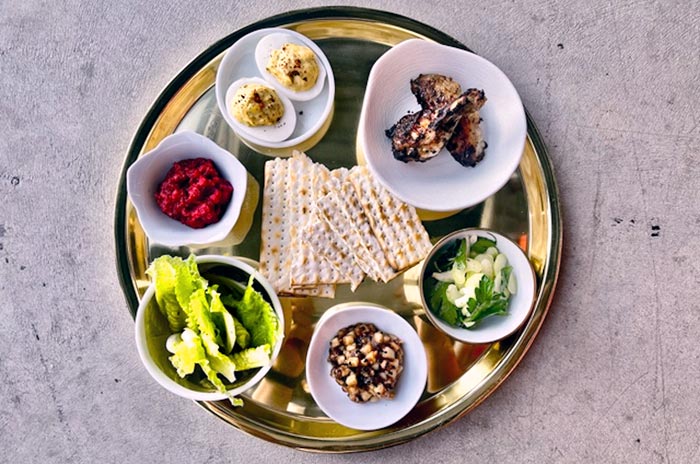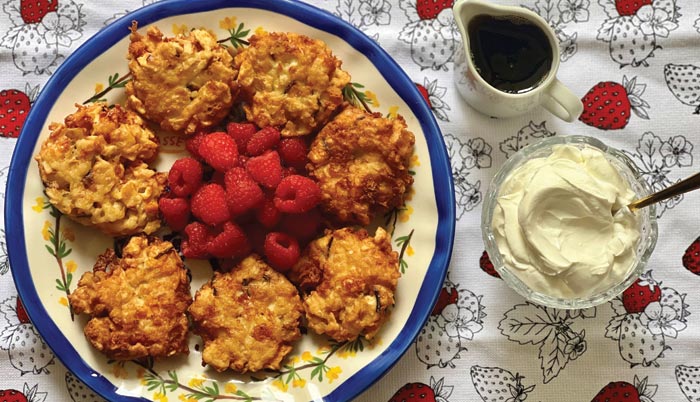If you’ve chosen non-kosher catering for the bar or bat mitzvah, you may still wish to accommodate guests who observe Jewish dietary laws. But with standards of kashrut observance varying from person to person, meeting everyone’s needs can get tricky.
“There is no fast and easy guide to accommodating kosher guests,” said Rabbi Reuven Nathanson, director of the Orthodox Union (OU) West Coast Kashruth Division. “What you’re allowed to do, what you should do and what looks right has to do with the time, place and people involved.”
The challenge, rabbis say, is not in providing kosher meal alternatives, which in the Los Angeles area are abundant, but in making sure your guests feel comfortable in a setting where they would not otherwise eat. Meshed with clear biblical dictates about what is and is not permissible under Jewish law is a host of rabbinic interpretations that shape the way individuals practice kashrut in their daily lives. To navigate this “gray zone,” Nathanson recommends a dialogue between the host, guests and the guests’ rabbinic adviser to find a solution that best adheres to their religious preferences.
The following tips address common issues that arise when accommodating kosher-observant guests at a non-kosher event.
Fresh Produce
While fresh vegetables and fruit do not need kosher certification, problems can arise in their preparation. Judaism’s strict prohibition against eating insects requires a level of cleaning and inspection that exceeds government standards, especially for leafy greens and fresh herbs, Nathanson says. Many kosher observers therefore won’t eat from the same salad prepared for everyone else. For those who don’t, kosher certified, prepackaged salads served on paper plates may be a suitable alternative.
Fruit is typically less problematic, though here too guests may refrain from eating from the main offering.
“I tell people under no circumstances can they eat fruit because of the risk of cross contamination,” said Rabbi Yakov Vann, director of Kashrut Services at the Rabbinical Council of California (RCC). “There is no way you can have total isolation [from non-kosher foods] in a catering facility.”
Main Course
When it comes to the entrée, prepackaged meals double-wrapped to avoid contamination are a popular standby. But with dozens of certification agencies offering kosher options, hosts may be hard pressed to know which to choose.
RCC’s Vann recommends selecting the highest kosher standard or a well-recognized symbol in the community. When in doubt, the host should ask guests for their preference or consult with a prominent rabbi in the community.
Whatever kosher meal is selected, it must not resemble the main offering in order to avoid the perception that the kosher observer is not concerned with Jewish dietary laws.
“If what you’re doing is OK but looks wrong, you can’t do it,” OU’s Nathanson said. “So if the main meal is chicken, don’t serve chicken to the kosher person. Have something different.”
To further distinguish the kosher meal, Vann recommends serving it on paper plates, not on duplicate china.
Double-wrapped meals can be heated in regular ovens. Guests should be asked ahead of time if they’d like their meals brought out open or if they would prefer to open the wrappings themselves.
Some local venues have facilities for preparing kosher alternatives in-house. Hosts should review this option with guests to determine whether and under what circumstances that is acceptable.
Beverages
Soft drinks and coffee brewed in industrial percolators are typically fine for all levels of kosher observance. Liquor and wine must be certified kosher.
Sabbath
Kosher food cannot be transported on the Sabbath, so food intended for observant guests must arrive at the venue prior to sunset on the Friday before the event or after sundown on Saturday.
Likewise, kosher food cannot be heated in ovens that have been lit on the Sabbath. For Saturday afternoon bar mitzvah parties, items that do not require warming are a safe choice.
Hand Washing
Observant Jews perform the ritual of hand washing before eating meals with bread. Hosts should supply guests with a glass and provide access to a sink outside the bathroom.
Breakfast Buffets
Breakfast and brunch buffets are typically easier than formal dinners because cereals, dairy products and other items can be presented in their original packaging, Nathanson said. Selecting products with a preferred kosher certification and providing disposable plates and utensils go a long way toward ensuring that kosher observers leave your event satisfied and well fed.





















 More news and opinions than at a Shabbat dinner, right in your inbox.
More news and opinions than at a Shabbat dinner, right in your inbox.